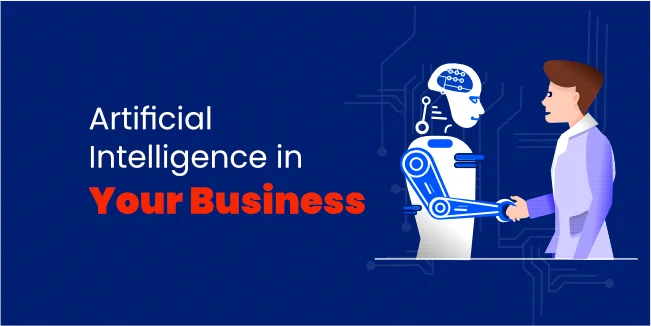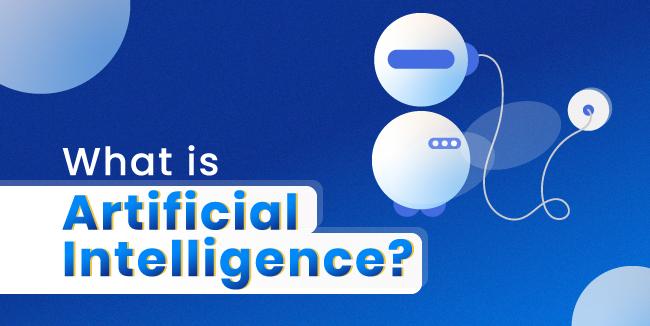Why You Should Use Artificial Intelligence in Your Business

Artificial Intelligence (AI) is still commonly associated with science fiction dystopias. Still, this notion is fading as artificial intelligence develops and becomes more ordinary in our times. Artificial intelligence may be found everywhere today, even if you don't become aware of it.
Artificial intelligence is already having a significant influence on business. The vast majority of us regularly interact with artificial intelligence in one form or another. Artificial intelligence is rapidly revolutionizing almost every commercial process and sector worldwide, from common uses while browsing the internet to breathtaking engineering marvels.
Artificial intelligence is such a broad concept that it is impossible to describe all its possibilities in one article. That is why we have created another article on a specific field, which is "How is Artificial Intelligence used in Education?". From it you will learn everything you need to know about AI in education.
Therefore, it is the best time to realize that artificial intelligence is not a dream of the future that we have to wait for. It is the present reality, and it makes no sense to deny it. The sooner we learn about the benefits of introducing artificial intelligence into our company's life, the better. Today's business world calls for businesses to have a deep understanding of their consumers' wants and preferences. Businesses must succeed and remain relevant in today's competitive market. Organizations may now uniquely understand and engage customers using artificial intelligence, automate business processes, and increase productivity and revenue while lowering operational expenditures.
What is Artificial Intelligence?

Read our “Introduction to Artificial Intelligence” to learn about this technology from the beginning, its history and assumptions.
We have been dealing with the concept of artificial intelligence in the mainstream world for a relatively short time. However, artificial intelligence has been with us for over half a century. Specialists and even ourselves every day are improving it.
We, ordinary multi-device users, do this by searching in the web app or browser, watching movies on streaming platforms, rating posts on social media, or even searching for the best route in the map application. As a result, you must remember that at least a portion of it might be supported or utilize artificial intelligence when running a business.
The most straightforward approach to comprehending AI is to think about it as any computer software that performs human-like activities, such as learning, planning, and resolving problems.
As artificial intelligence is quite a general term, it is clear that it has its types and kinds. The most popular branches are the ones you've probably heard about, i.e., Machine Learning and Deep Learning. But we will only deal with them in terms of their application in business. If you want to know more about Machine Learning and Deep Learning, see our article on this subject.
Besides the parts just mentioned, artificial intelligence technology has its types:
Reactive AI
Reactive AI is the most basic but still quite useful kind of artificial intelligence since it responds to current circumstances, as its name implies. Reactive AI algorithms work in that they were designed with a consistent output corresponding to the data it processes. These reactive machines will respond to identical situations simultaneously, every time. There will never be a variance in action if the input is the same. Reactive machines are unable to learn or conceive of the past or future. The spam filter and Netflix's algorithmic recommendations are examples of reactive AI.
Limited Memory
Based on its previous exposure and experience, it can learn and improve over time in the same manner as the human brain makes its neurons connect. It is the most known artificial intelligence type as it is widely used and improved. Limited memory can tackle difficult classification problems, and it makes predictions based on data collected in the past. The best example of Limited Memory is the autonomous systems in cars, which collect a large amount of data with each use and, thanks to them, learn how to act in similar situations in the future.
Theory of Mind
Everything is connected to AI technology. Therefore, since we created a self-learning machine, we wanted something more like humanity. Hence the idea of the android. A machine that feels like a human being. AI's Theory of Mind assumes that robots would rapidly shift behavior based on emotions to mimic how fluid this process is in human communication. The main goal is to create a robot that will accompany a person, help him in his daily activities, and sometimes act as a tool for therapy.
Self Aware
It is the final stage (at least for the moment) in the development of artificial intelligence. It assumes that artificial intelligence will be aware of human emotions and mental states and understand its own emotions. At the moment, this AI has not yet been perfected because we lack the hardware and algorithms required to do so. The goal is to create artificial superintelligence.
Artificial Intelligence in Business Today

Knowing what artificial intelligence can do, we can search for how it can be used. It is what researchers did. Seeing the enormous potential, they created many tools to improve various areas of life. We will deal with the Artificial Intelligence-Business connection.
Artificial intelligence can be found in many different use cases across industries of all varieties, including the healthcare industry, sales, HR, operations, manufacturing, marketing, and technology. Commonly discussed use cases for AI include self-driving cars and other autonomous technology, the internet of things (IoT), medical diagnosis, robotic assistance in manufacturing, contactless shopping, job candidate selection, and so much more. The possibilities for business are truly boundless.
It's good to know that AI has become some behind-the-scenes player to help businesses enhance efficiency, streamline workflows and increase productivity. Thanks to its versatility, people could educate her on specific types and uses to facilitate and improve the business operations from many industries. These types include Automation, Data Analysis, and Natural Language Processing, among others. Let's focus on what they are and what they are characterized by.
Automation
Automation development allows you to free people from often monotonous, often performed but constant, unchanging activities. It is worth remembering that this does not mean that people will be completely unnecessary for some activities. They will be needed to operate and control such a machine. One of the best examples of artificial intelligence that automates human work is car factories. Tesla has reached such a point in developing robotic process automation that almost every car is assembled without human intervention.
Data Analytics
Data Analytics offers the possibility of extensive research that gradually develops on its own. Companies can use Data Science to check work patterns and calculate the chances of success, available subsequent solutions, and their possible outcomes. It greatly speeds up and streamlines the development process. Thanks to Data Analysis, it is also possible to discover insights previously unavailable to humans.
Natural Language Processing (NLP)
Natural Language Processing enables computers to interact with people in their language and scales various language-related processes. Computers can now read text, listen to the speech, interpret it, assess sentiment, and identify critical sections thanks to NLP. Natural Language Processing allows search engines to be more intelligent, chatbots more helpful, and accessible for hearing-impaired persons.
Machine Learning in Business
Machine Learning algorithms help extract meaningful information from a vast set of raw data. Implemented right, Machine Learning can solve various business complexities problems and predict complex customer behaviors. Thanks to that, it is possible to develop business strategies based on customer expectations. We have also seen some of the major technology giants, such as Google, Amazon, Microsoft, etc., coming up with their Cloud Machine Learning platforms.
Tools such as spam detection, image recognition, recommendations, or customer data analysis make life easier for business management and improve the customer experience. These are further proof that implementing AI in business is one of the best decisions for a company.
Deep Learning in Business
Deep learning is a type of machine learning that has revolutionized many application fields, including autonomous vehicles and smart personal assistants. However, the improvements don't stop there. Deep learning has a huge influence on business innovation across many sectors. Some of the world's major corporations employ AI applications, such as fraud detection and supply chain optimization.
Many different Deep learning models are rapidly transforming many industries, including healthcare, energy, fintech, transportation, and others, to rethink traditional business processes with digital intelligence. Thanks to Deep Learning, many business leaders limit the processing of human resources that can focus on even greater development of data collected by artificial intelligence. It fuels these companies and makes them unmatched for many.
How does Artificial Intelligence help with Business Processes?

As we wrote earlier, AI has many applications in business growth, which can be used in many industries. It may have less useful business functions, but on the other, it is artificial intelligence that will be the fundament of the entire industry functioning.
In order to create an AI adapted to our business, you need to choose the right tools, and thus the right tech stack. In our article "Techstack - what is it and how to choose the best one?" we explain the whole company tech stack issue. Read and know more!
AI has significant commercial advantages. It is what you can anticipate from such a complex technology. Many operational activities may be automated with AI, freeing company executives to focus on more complicated business issues and decision-making. The other benefit is that AI technology can complete various data analysis tasks that would take humans hours to finish. It allows businesses to cost reductions on salaries while also increasing revenue. But that's not the end of improving what people do. Man is a fallible creature; therefore, typically, human errors occur in production or finishing. AI implementation can eliminate them and therefore improve quality. Humans also need to supply the context and understand nuanced situations; data science certainly benefits from reduced error, allowing for more accurate predictions and data analytics.
We've outlined some of the key benefits of using AI in business, but they're fairly general. So let's deal with specific examples. Here are some of the more important industries where AI is especially useful.
AI in Marketing
AI can improve the customer experience on a website through intelligent personalization. With this tool, marketers may use AI technology to gain more insight into their target consumers. The information collected can then boost conversions while reducing the burden on marketing teams.
Basic things like a user's IP number that says their location can give the AI a ton of information. Thanks to them, AI can decide what ads to show and propose in relation to the user's coordinates, demographics, device, and interaction with the website.
Another element of targeted marketing to specific users is personalized push notifications. It may be customized to individual users via behavioral personalization, ensuring that they receive the most relevant message at the perfect time. The use of machine learning algorithms in search engine optimization is now being extended to include analyzing the intent behind query term selections and the content of searches. Another possible use is to examine your own or competitors' SEO methods for any weak spots that may exist or to take advantage of keywords that rivals aren't using.
AI in Sales
If marketing can take advantage of AI, the sales department is even more so. Automation AI is already affecting sales and will continue to do so.
Artificial intelligence allows for the multi-platform development of automated and precise sales predictions based on all client interactions and previous sales outcomes. Forecasts are a good example. They are difficult, but they may be automated.
AI also aids in lead prioritization. AI can analyze historical data, social media postings, and salesperson's customer interaction history to rank prospects or leads in the pipeline based on their chances of closing successfully. Thanks to this technology, many tools are developed to help sales professionals prioritize customers based on their probability of converting.
Sales can also be raised by using bots to send emails or chat with site visitors. According to a Forbes report from 2019, chatbots are expected to boost sales by 67 percent. They may assist in starting the conversation by delivering a tailored message, allowing consumers to interact right away or return later. AI algorithms can also generate customized emails that save sales reps from sending personalized communications to many individual clients.
AI in Human Resources
HR experts have to adapt to every situation in employees' lives. Especially now. Where face-to-face meetings are less possible, it is important, for example, to recognize the intentions of the job applicant. As always, similar tasks are facilitated by AI.
Many organizations have invested in AI to assist with the recruiting procedure. HR executives may use AI to match a potential applicant's previous work experiences and interests with the ideal jobs. It is worth mentioning that AI also helps job seekers.
AI can study formal and informal connections in a company, which may help create business plans to boost organic communication flow. That may aid your organization in becoming more sustainable and successful.
What are the Challenges of Implementing AI?

AI in business brings many advantages, benefits, and opportunities. However, the process requires hard work, often new knowledge, and sometimes new employees to support artificial intelligence. There is a lack of trust in AI technology. Many similar myths repel the idea of implementing artificial intelligence. Concerns about data privacy and security, as well as expectations that AI will take people's jobs.
Earlier mentioned, probably one of the most famous myths is that human workers will lose their jobs to machines controlled by artificial intelligence. They will be laid off and left destitute. It is worth remembering that artificial intelligence is supposed to develop business, but it will not. Workers whose activities will be replaced by machines continue to be of great value and experience. Therefore, they can be involved in controlling the activities of AI.
One of the challenges with AI is that it needs a large amount of clean data. AI will be limited in learning and analyzing without many good data sets. Only as strong as the data we use to train machine learning algorithms.
Another major barrier is the high demand for computing power. Supercomputing powers and that sort of technical hardware are required to analyze billions and billions of data points. Businesses will require enterprise-level computer resources to exploit AI's potential and big data fully.
Possible Future AI Trends
Looking at how AI develops and how people and companies eagerly use its services gives the impression that artificial intelligence in everyday life is not a temporary invention or fashion. AI will stay with us for longer.
That is why it is so important to know in what direction the development of this technology will go. It is important both for businesses and entrepreneurs, as well as for ordinary users like us.
We believe that businesses that are now adopting AI in moderation but have far more ambitious implementation plans for the future will be just as well-positioned to reap advantages as those who jumped on analytics early. AI can improve the efficiency of information-intensive industries such as marketing, health care, financial services, education, and professional services by simultaneously making them more valuable and less expensive to society.
Final Thoughts
AI and Machine Learning have completely changed business. AI has revolutionized businesses for years to come, from IT operations to sales. AI implementation in company environments saves time on mundane activities while boosting productivity and improving customer experience. It may also aid in preventing errors and identifying potential problems at a level that is impossible for humans. It's no surprise that businesses use it to enhance various commercial functions, from logistics to recruitment and employment. We believe that firms at the forefront of AI will profit financially and dominate their rivals in the future.